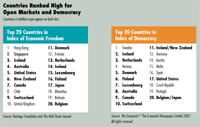DEMOCRACY AROUND THE WORLD | Giving citizens a voice
11 June 2008
About This Issue
About This Issue
The World Bank’s Commission on Growth and Development recently released a report analyzing the factors that make for economic growth in developing countries. The group of international experts, including two Nobel Prize winners, found that one key is “credible, inclusive, and pragmatic governments.” Other factors the commission identified were “the quality of the debate” in a country on public policy, vigor in fighting corruption, and equality of opportunity – all characteristics popularly associated with democratic systems.
The chart makes a similar point. Place the top 20 countries listed in the Index of Economic Freedom next to the top 20 in the Index of Democracy, and what do you see? Much overlap. Thirteen countries appear on both lists. There would appear to be, at a minimum, an association between a productive free market and a democratic form of government.
Michael Mandelbaum, author of the new book Democracy’s Good Name, is more emphatic. “The principal source of political democracy,” he writes in this issue of eJournal USA, “is a free-market economy. While there have been, and continue to be, countries that practice free-market economics but not democratic politics, no country in the 21st century that is a political democracy lacks a free-market economy.” Yet an article last year by public policy professor Robert Reich in the respected journal Foreign Policy is titled “How Capitalism Is Killing Democracy.”
Clearly, the connection between markets and democracy is not a straight line. Since Adam Smith’s An Inquiry into the Causes and Nature of the Wealth of Nations appeared in 1776, such big economic thinkers as Max Weber, Joseph Schumpeter, and Lester Thurow have been debating this complex relationship. Is it possible to have free markets without democracy? Which develops first? Can the powerful, universal incentive of economic growth lead to greater democracy in countries that are not democratic?
The international experts in this issue offer some answers to these questions, and point out such relevant variables as opportunities for wealth creation, the role of social trust, and concepts of "voice" and accountability. Our goal, however, is not to resolve a centuries-old intellectual debate but to deepen our readers’ understanding about the nuances of what is undeniably a matter of importance for everybody in the world today.
-- The Editors

